20 dec 2015

The Israeli occupation forces (IOF) stormed on Sunday morning two schools in al-Khalil, sparking fear among schoolchildren.
Activist Rateb al-Jabour said the Israeli occupation army rolled into Yatta town and violently searched al-Majaz school, generating a remarkable state of terror among the students.
The IOF summoned one of the school staff, Moussa Abu Aram, for questioning.
The occupation troops further stormed al-Musafir basic school and wreaked havoc on its classrooms.
In a related development, violent clashes burst out in al-Khader town, in Bethlehem, after the IOF targeted schoolchildren with randomly-shot volleys of tear gas canisters.
Activist Rateb al-Jabour said the Israeli occupation army rolled into Yatta town and violently searched al-Majaz school, generating a remarkable state of terror among the students.
The IOF summoned one of the school staff, Moussa Abu Aram, for questioning.
The occupation troops further stormed al-Musafir basic school and wreaked havoc on its classrooms.
In a related development, violent clashes burst out in al-Khader town, in Bethlehem, after the IOF targeted schoolchildren with randomly-shot volleys of tear gas canisters.
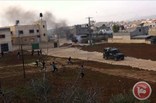
Four Palestinians were shot and injured after Israeli forces raided the occupied West Bank village of Tammun, hometown of the suspect of a stab attack that left three Israelis injured the day before, locals said.
Local sources told Ma’an that Israeli soldiers entered the village around 3:00 a.m and ransacked the home of Mahmoud Faisal Bsharat, 20, who was detained Saturday after carrying out the attack in Raanana, north of Tel Aviv.
Clashes then broke out between Palestinian youths and Israeli forces, locals said, leaving one shot by live fire and three others hit with rubber-coated steel bullets.
All were transferred to the Turkey hospital in the nearby town of Tubas for medical treatment, locals added.
An Israeli army spokesperson did not have immediate information but told Ma’an they were looking into the incident.
Bsharat on Saturday stabbed three Israelis in the Israeli city of Raanana, leaving one moderately injured and two lightly injured, Israeli police said at the time.
Locals told Ma’an that Bsharat's family evacuated their home in Tammun following the attack out of fear that it would be demolished by Israeli forces.
Israeli Prime Minister Benjamin Netanyahu made moves in October to expedite punitive demolitions on the family homes of Palestinians who carry out attacks on Israelis, and several have been carried out since.
Near-daily attacks and attempted attacks carried out by Palestinian individuals on Israeli military and civilians began at the start of October and have continued through into December, leaving 19 Israelis dead since Oct. 1.
A large portion of at least 125 Palestinians to be killed during the same time period have been shot by Israeli forces or settlers during such attacks.
The circumstances of many deaths have been disputed, with investigations by rights group pointing to cases of extrajudicial execution by Israeli forces of Palestinians who posed no threat at the time of their death.
The majority of individuals to carry out attacks have not belonged to a political faction or armed group, reportedly resulting in a policy of collective punishment implemented by Israel in effort to stop the attacks.
Such measures have included raids of attackers’ hometowns and surrounding areas following an attack, wide-scale arrests, and withholding the bodies of Palestinians who carry out attacks.
Local sources told Ma’an that Israeli soldiers entered the village around 3:00 a.m and ransacked the home of Mahmoud Faisal Bsharat, 20, who was detained Saturday after carrying out the attack in Raanana, north of Tel Aviv.
Clashes then broke out between Palestinian youths and Israeli forces, locals said, leaving one shot by live fire and three others hit with rubber-coated steel bullets.
All were transferred to the Turkey hospital in the nearby town of Tubas for medical treatment, locals added.
An Israeli army spokesperson did not have immediate information but told Ma’an they were looking into the incident.
Bsharat on Saturday stabbed three Israelis in the Israeli city of Raanana, leaving one moderately injured and two lightly injured, Israeli police said at the time.
Locals told Ma’an that Bsharat's family evacuated their home in Tammun following the attack out of fear that it would be demolished by Israeli forces.
Israeli Prime Minister Benjamin Netanyahu made moves in October to expedite punitive demolitions on the family homes of Palestinians who carry out attacks on Israelis, and several have been carried out since.
Near-daily attacks and attempted attacks carried out by Palestinian individuals on Israeli military and civilians began at the start of October and have continued through into December, leaving 19 Israelis dead since Oct. 1.
A large portion of at least 125 Palestinians to be killed during the same time period have been shot by Israeli forces or settlers during such attacks.
The circumstances of many deaths have been disputed, with investigations by rights group pointing to cases of extrajudicial execution by Israeli forces of Palestinians who posed no threat at the time of their death.
The majority of individuals to carry out attacks have not belonged to a political faction or armed group, reportedly resulting in a policy of collective punishment implemented by Israel in effort to stop the attacks.
Such measures have included raids of attackers’ hometowns and surrounding areas following an attack, wide-scale arrests, and withholding the bodies of Palestinians who carry out attacks.
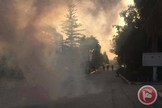
At least 9 Palestinian students were shot and injured on Sunday when clashes broke out with Israeli forces outside a university in the occupied West Bank city of Tulkarem.
Clashes erupted after a group of Israeli soldiers deployed at an Israeli military base illegally set up on the campus of Palestine Technical University- Kadoorie, locals told Ma’an.
Soldiers reportedly advanced towards university buildings where they were confronted by students throwing stones.
Palestinian medical sources at Tulkarem’s public hospital told Ma’an that several students were evacuated in Palestinian Red Crescent ambulances following the clashes.
Four of the victims were hit with live ammunition in their lower extremities and five others were injured by rubber-coated steel bullets, medics said, adding that a paramedic was injured by a rubber-coated steel bullet while evacuating students.
Dozens of others suffered from excessive tear gas inhalation, medics added.
An Israeli army spokesperson did not have immediate information on the incident.
Violence on the campus of Palestine Technical University has been near-daily in recent weeks.
Following student-organized marches that started in October to protest Israeli violations and raids onto the university campus, administrators reported that Israeli forces had positioned themselves at a temporary base on university property.
A head administrator of the university, Dirar Elayyan, told Ma’an earlier this month that non-students then began to enter the campus and throw stones at the Israeli base, prompting violent clashes that have severely interrupted normal campus life and left several students seriously injured.
The university reportedly began preparations to build a wall to prevent the entrance of outsiders last month, however Israeli forces stopped the construction and confiscated a bulldozer, assaulting workers, Elayyan said.
Palestinian leadership has recently requested international protection for Palestinians in the occupied Palestinian territory amid a recent increase in violence, but concrete moves have yet to be made to address the request.
Clashes erupted after a group of Israeli soldiers deployed at an Israeli military base illegally set up on the campus of Palestine Technical University- Kadoorie, locals told Ma’an.
Soldiers reportedly advanced towards university buildings where they were confronted by students throwing stones.
Palestinian medical sources at Tulkarem’s public hospital told Ma’an that several students were evacuated in Palestinian Red Crescent ambulances following the clashes.
Four of the victims were hit with live ammunition in their lower extremities and five others were injured by rubber-coated steel bullets, medics said, adding that a paramedic was injured by a rubber-coated steel bullet while evacuating students.
Dozens of others suffered from excessive tear gas inhalation, medics added.
An Israeli army spokesperson did not have immediate information on the incident.
Violence on the campus of Palestine Technical University has been near-daily in recent weeks.
Following student-organized marches that started in October to protest Israeli violations and raids onto the university campus, administrators reported that Israeli forces had positioned themselves at a temporary base on university property.
A head administrator of the university, Dirar Elayyan, told Ma’an earlier this month that non-students then began to enter the campus and throw stones at the Israeli base, prompting violent clashes that have severely interrupted normal campus life and left several students seriously injured.
The university reportedly began preparations to build a wall to prevent the entrance of outsiders last month, however Israeli forces stopped the construction and confiscated a bulldozer, assaulting workers, Elayyan said.
Palestinian leadership has recently requested international protection for Palestinians in the occupied Palestinian territory amid a recent increase in violence, but concrete moves have yet to be made to address the request.

Israeli occupation forces (IOF) shot and arrested a young Palestinian woman in al-Khalil at noon Sunday after claiming she tried to stab a soldier.
Local sources told the PIC reporter that the young woman was walking in al-Shuhada street near the Ibrahimi Mosque when she was shot and injured in her head by the IOF soldiers.
They said that the girl suffered moderate wounds and was detained by the soldiers.
The sources pointed out that a number of local youths were wounded when they tried to help the girl, adding that one of them was injured in his face after the IOF soldiers and snipers on rooftops of nearby buildings fired teargas canisters and live bullets at them.
Violent confrontations were reported in nearby Bab el-Zawiya after the incident between the IOF soldiers and young men.
Palestinian shot after stab attempt in Hebron's Old City
Israeli forces on Sunday shot a Palestinian near an Israeli military checkpoint at the entrance of al-Shuhada street in Hebron’s Old City after she attempted to carry out a stabbing attack.
Witnesses told Ma'an that a 35-year-old woman from a Hebron-area village attempted to stab a soldier before she was shot in the head with a rubber-coated steel bullet.
According to witnesses, a young Palestinian man approached the woman and attempted to help her but was prevented when he was also shot by a rubber-coated steel bullet.
Palestinian Red Crescent paramedics then gave the woman medical treatment on site before she was taken into custody by Israeli soldiers, witnesses added.
Israeli media reported that the woman was in moderate to serious condition after being shot.
An Israeli army spokesperson confirmed the incident but told Ma’an they were still investigating details of the attempted attack.
The attack attempt is the latest to take place in the occupied Palestinian territory, where an escalation of violence that kicked off in October has continued full-fledged into December.
Hebron’s Old City has been at the epicenter of the recent tensions, where Israeli forces last week shot and injured 16-year-old Lama Munthir Hafith al-Bakri northeast of Hebron’s Old City after the army said she attempted to stab an Israeli pedestrian.
Palestinian residents of the Hebron governorate have remained under severe restrictions on movement for several weeks.
Routes leading from Hebron-area villages to main traffic arteries have either been entirely blocked to vehicular movement or are controlled by flying checkpoints manned by Israeli military forces, according to the UN Office for the Coordination of Humanitarian Affairs.
Hebron’s Old City was meanwhile declared a closed military zone last month, with entrance only allowed to Palestinian residents of the Israeli-controlled H2 area as well as Israeli settlers that live in illegal settlements across the area.
Hundreds of Palestinians from across the Hebron district last week protested for the return of the bodies of 21 Palestinians who were killed by Israeli military or settlers.
Israeli authorities have withheld the bodies of suspected attackers from the families, sparking outrage especially among Hebron communities.
Local sources told the PIC reporter that the young woman was walking in al-Shuhada street near the Ibrahimi Mosque when she was shot and injured in her head by the IOF soldiers.
They said that the girl suffered moderate wounds and was detained by the soldiers.
The sources pointed out that a number of local youths were wounded when they tried to help the girl, adding that one of them was injured in his face after the IOF soldiers and snipers on rooftops of nearby buildings fired teargas canisters and live bullets at them.
Violent confrontations were reported in nearby Bab el-Zawiya after the incident between the IOF soldiers and young men.
Palestinian shot after stab attempt in Hebron's Old City
Israeli forces on Sunday shot a Palestinian near an Israeli military checkpoint at the entrance of al-Shuhada street in Hebron’s Old City after she attempted to carry out a stabbing attack.
Witnesses told Ma'an that a 35-year-old woman from a Hebron-area village attempted to stab a soldier before she was shot in the head with a rubber-coated steel bullet.
According to witnesses, a young Palestinian man approached the woman and attempted to help her but was prevented when he was also shot by a rubber-coated steel bullet.
Palestinian Red Crescent paramedics then gave the woman medical treatment on site before she was taken into custody by Israeli soldiers, witnesses added.
Israeli media reported that the woman was in moderate to serious condition after being shot.
An Israeli army spokesperson confirmed the incident but told Ma’an they were still investigating details of the attempted attack.
The attack attempt is the latest to take place in the occupied Palestinian territory, where an escalation of violence that kicked off in October has continued full-fledged into December.
Hebron’s Old City has been at the epicenter of the recent tensions, where Israeli forces last week shot and injured 16-year-old Lama Munthir Hafith al-Bakri northeast of Hebron’s Old City after the army said she attempted to stab an Israeli pedestrian.
Palestinian residents of the Hebron governorate have remained under severe restrictions on movement for several weeks.
Routes leading from Hebron-area villages to main traffic arteries have either been entirely blocked to vehicular movement or are controlled by flying checkpoints manned by Israeli military forces, according to the UN Office for the Coordination of Humanitarian Affairs.
Hebron’s Old City was meanwhile declared a closed military zone last month, with entrance only allowed to Palestinian residents of the Israeli-controlled H2 area as well as Israeli settlers that live in illegal settlements across the area.
Hundreds of Palestinians from across the Hebron district last week protested for the return of the bodies of 21 Palestinians who were killed by Israeli military or settlers.
Israeli authorities have withheld the bodies of suspected attackers from the families, sparking outrage especially among Hebron communities.
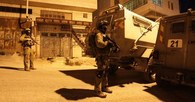
An abduction sweep by the Israeli occupation forces (IOF) rocked the occupied West Bank overnight Saturday and culminated in violent clashes across the region.
Sources based in al-Khalil, in the southern West Bank, said the IOF rolled into the city and kidnapped three Palestinian citizens.
The IOF further stormed Beit Ummar town, where they wreaked havoc on Morshed Awad’s family home and smashed the gates of a local shop.
A series of arbitrary home break-ins was also documented in Yatta and Samou’ along with several towns of western al-Khalil.
Israeli soldiers, cops and settlers also rolled into Nablus’ southern village of Duma at predawn time and performed a mock arson attack on the Dawabsheh family home.
By-standers at the scene said 20 Israeli army jeeps rolled into Duma at 2 a.m. and stopped at the Dawabsheh family home, where three settlers mimicked the arson attack carried out on July 31, 2015 by Israeli vandals, burning 18-month-old Ali and his parents to death.
Meanwhile, violent clashes burst out in Tamoun village, in Tubas, where the occupation patrols attacked Palestinian protesters and civilian homes with live rounds and tear gas canisters.
A number of Palestinian civilians were rushed to local clinics after they were hit by live bullet shrapnel. Others were treated for critical breathing disorders due to heavy tear gas inhalation.
The IOF further sealed off the Hamra checkpoint and propped up military grip around the area.
Dozens of Israeli settlers stormed Qaryout, in southern Nablus, and cordoned off a Palestinian land near the illegal Gilo settlement with barbed wire in an attempt to hold sway over the land lot.
The IOF further stormed Aleziyera town, near Occupied Jerusalem, and kidnapped an unidentified youth.
Tulkarem-based sources also spoke out against the frequent assaults by Israeli settlers and soldiers on the Palestinian natives and homes.
Locals said a set of makeshift roadblocks has been randomly pitched across Tulkarem, where Palestinian civilians have been subjected to exhaustive questioning and provocation on a quasi-daily basis.
Sources based in al-Khalil, in the southern West Bank, said the IOF rolled into the city and kidnapped three Palestinian citizens.
The IOF further stormed Beit Ummar town, where they wreaked havoc on Morshed Awad’s family home and smashed the gates of a local shop.
A series of arbitrary home break-ins was also documented in Yatta and Samou’ along with several towns of western al-Khalil.
Israeli soldiers, cops and settlers also rolled into Nablus’ southern village of Duma at predawn time and performed a mock arson attack on the Dawabsheh family home.
By-standers at the scene said 20 Israeli army jeeps rolled into Duma at 2 a.m. and stopped at the Dawabsheh family home, where three settlers mimicked the arson attack carried out on July 31, 2015 by Israeli vandals, burning 18-month-old Ali and his parents to death.
Meanwhile, violent clashes burst out in Tamoun village, in Tubas, where the occupation patrols attacked Palestinian protesters and civilian homes with live rounds and tear gas canisters.
A number of Palestinian civilians were rushed to local clinics after they were hit by live bullet shrapnel. Others were treated for critical breathing disorders due to heavy tear gas inhalation.
The IOF further sealed off the Hamra checkpoint and propped up military grip around the area.
Dozens of Israeli settlers stormed Qaryout, in southern Nablus, and cordoned off a Palestinian land near the illegal Gilo settlement with barbed wire in an attempt to hold sway over the land lot.
The IOF further stormed Aleziyera town, near Occupied Jerusalem, and kidnapped an unidentified youth.
Tulkarem-based sources also spoke out against the frequent assaults by Israeli settlers and soldiers on the Palestinian natives and homes.
Locals said a set of makeshift roadblocks has been randomly pitched across Tulkarem, where Palestinian civilians have been subjected to exhaustive questioning and provocation on a quasi-daily basis.
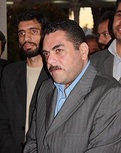
Samir al-Kuntar
The Israeli Air Force assassinated, on Saturday at night, the former political prisoner and senior Hezbollah leader, Samir al-Kuntar, in an air strike in the Jermana area of the Syrian capital Damascus.
The Hezbollah party in Lebanon said the Israeli Air Force violated Syrian air space at around 10:30 at night, and fired five missiles into a residential building, killing six people, including al-Kuntar, and wounding at least twelve others.
The Civil Defense Forces in Jermana said two Israeli war jets violated Syrian airspace and struck the building with four missiles.
Initial reports were first unconfirmed, but his brother later announced on his Twitter account the confirmed dead of al-Kuntar.
Samir al-Kuntar spent 29 years in Israeli prisons, and was released on July 16 2008, under a prisoner-swap agreement reached through negotiation between Hezbollah and the Israeli government through a third party.
As part of the agreement, Israel released al-Kuntar and four other Hezbollah members, who were taken prisoner during the July 2006 war between Hezbollah and Israel, in which Israeli troops invaded and bombed Southern Lebanon, and Hezbollah fired rockets across the border into Israel.
Hezbollah is the leading party in southern Lebanon, and has a fighting force that works to deflect further Israeli invasions into Lebanon.
The 2008 agreement also included the transfer of the remains of 199 fighters, including Palestinian and Lebanese fighters, in exchange for Hezbollah releasing the remains of Israeli soldiers killed during the war.
Retired Israeli major general and current Member of Knesset (Parliament) with the Zionist Union party, Major. Gen. Eyal Ben-Reuven, hailed the reports of the assassination, and said that the Air Force and all others involved in the incident “should be commended for the successful operation.”
Ben-Reuven, the former head of the Northern Command on the Israeli army, said the Israeli government is preparing for retaliatory attacks by Hezbollah.
Israel held al-Kuntar responsible for the April 22nd 1979 attack that led to the death of four Israelis: a police officer, an Israeli civilian and his 4-year-old daughter, while the man’s other daughter, 2, was accidentally suffocated by her mother, while trying to keep her quiet. The attackers allegedly kidnapped the family in Nahariya and took them to a beach, then tried to load their hostages on a rubber boat.
Israeli police decided to attack with full force instead of attempting to negotiate, and the father of the family and a police officer were killed. The 4-year old was killed when her head hit a rock during the scuffle. Two fighters, identified as Abdul-Majid Aslan and Moayyad Mhanna, were killed, while al-Kuntar and Ahmad al-Abrass were captured. Al-Abrass was later released, along with 1150 detainees, in a prisoner swap agreement, led by the Popular Front for the Liberation of Palestine – General Command.
After capturing al-Kuntar, an Israeli court sentenced him to five life-terms, Upon his release in the prisoner swap deal, he returned to Lebanon and joined Hezbollah, then went on to live in Syria. Video
The Israeli Air Force assassinated, on Saturday at night, the former political prisoner and senior Hezbollah leader, Samir al-Kuntar, in an air strike in the Jermana area of the Syrian capital Damascus.
The Hezbollah party in Lebanon said the Israeli Air Force violated Syrian air space at around 10:30 at night, and fired five missiles into a residential building, killing six people, including al-Kuntar, and wounding at least twelve others.
The Civil Defense Forces in Jermana said two Israeli war jets violated Syrian airspace and struck the building with four missiles.
Initial reports were first unconfirmed, but his brother later announced on his Twitter account the confirmed dead of al-Kuntar.
Samir al-Kuntar spent 29 years in Israeli prisons, and was released on July 16 2008, under a prisoner-swap agreement reached through negotiation between Hezbollah and the Israeli government through a third party.
As part of the agreement, Israel released al-Kuntar and four other Hezbollah members, who were taken prisoner during the July 2006 war between Hezbollah and Israel, in which Israeli troops invaded and bombed Southern Lebanon, and Hezbollah fired rockets across the border into Israel.
Hezbollah is the leading party in southern Lebanon, and has a fighting force that works to deflect further Israeli invasions into Lebanon.
The 2008 agreement also included the transfer of the remains of 199 fighters, including Palestinian and Lebanese fighters, in exchange for Hezbollah releasing the remains of Israeli soldiers killed during the war.
Retired Israeli major general and current Member of Knesset (Parliament) with the Zionist Union party, Major. Gen. Eyal Ben-Reuven, hailed the reports of the assassination, and said that the Air Force and all others involved in the incident “should be commended for the successful operation.”
Ben-Reuven, the former head of the Northern Command on the Israeli army, said the Israeli government is preparing for retaliatory attacks by Hezbollah.
Israel held al-Kuntar responsible for the April 22nd 1979 attack that led to the death of four Israelis: a police officer, an Israeli civilian and his 4-year-old daughter, while the man’s other daughter, 2, was accidentally suffocated by her mother, while trying to keep her quiet. The attackers allegedly kidnapped the family in Nahariya and took them to a beach, then tried to load their hostages on a rubber boat.
Israeli police decided to attack with full force instead of attempting to negotiate, and the father of the family and a police officer were killed. The 4-year old was killed when her head hit a rock during the scuffle. Two fighters, identified as Abdul-Majid Aslan and Moayyad Mhanna, were killed, while al-Kuntar and Ahmad al-Abrass were captured. Al-Abrass was later released, along with 1150 detainees, in a prisoner swap agreement, led by the Popular Front for the Liberation of Palestine – General Command.
After capturing al-Kuntar, an Israeli court sentenced him to five life-terms, Upon his release in the prisoner swap deal, he returned to Lebanon and joined Hezbollah, then went on to live in Syria. Video

The Israeli Occupation Forces (IOF) opened fire Sunday morning at Palestinian farmers in central Gaza Strip. No casualties were reported during the attack.
Eyewitnesses reported that the IOF soldiers stationed at the border areas near al-Maghazi refugee camp in Deir al-Balah city opened gunfire at a group of Palestinian farmers and houses in the area.
The attack was carried out at the same time as Israeli army vehicles patrolled the borderline and drones hovered over the territory.
The armed attack forced the farmers to leave their agricultural lands.
Meanwhile, Israeli warplanes carried out mock raids on the Gaza Strip, spreading fear of imminent air strikes among the residents.
Loud explosions were heard across the Gaza Strip after Israeli F-16 jet fighters launched mock raids over the enclave.
The attack is another episode in Israel’s violations of the Cairo-brokered ceasefire accord signed on August 26, 2014, in the wake of a large-scale military offensive on the coastal enclave.
Eyewitnesses reported that the IOF soldiers stationed at the border areas near al-Maghazi refugee camp in Deir al-Balah city opened gunfire at a group of Palestinian farmers and houses in the area.
The attack was carried out at the same time as Israeli army vehicles patrolled the borderline and drones hovered over the territory.
The armed attack forced the farmers to leave their agricultural lands.
Meanwhile, Israeli warplanes carried out mock raids on the Gaza Strip, spreading fear of imminent air strikes among the residents.
Loud explosions were heard across the Gaza Strip after Israeli F-16 jet fighters launched mock raids over the enclave.
The attack is another episode in Israel’s violations of the Cairo-brokered ceasefire accord signed on August 26, 2014, in the wake of a large-scale military offensive on the coastal enclave.
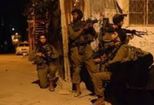
Palestinian medical sources have reported, Saturday, that two children were shot and injured by Israeli army fire, in the Qalandia refugee camp, north of occupied Jerusalem. Two Palestinians injured near Qalqilia.
The two were shot, in their homes, during armed clashes between Palestinian fighters and Israeli soldiers.
The sources said Fida' Shweiki, 14, was shot in the abdomen while in her home, facing the Qalandia terminal, after the soldiers randomly opened fire, targeting homes and stores, while another child was shot in his arm.
A number of Palestinians also hurled explosive charges on the soldiers, and exchanged fire with them, approximately for twenty minutes.
In related news, a Palestinian teenager, 17, was shot with a live round, and another with a rubber-coated steel bullet, when the soldiers attacked, a nonviolent procession in Kafr Qaddoum, in the northern West Bank district of Qalqilia, Saturday.
The Palestinian was shot with a live round in his thigh, and a rubber-coated steel bullet in his knee.
The soldiers chased him, but he managed to escape, after dozens of youths hurled stones and empty bottles on the soldiers.
The two were shot, in their homes, during armed clashes between Palestinian fighters and Israeli soldiers.
The sources said Fida' Shweiki, 14, was shot in the abdomen while in her home, facing the Qalandia terminal, after the soldiers randomly opened fire, targeting homes and stores, while another child was shot in his arm.
A number of Palestinians also hurled explosive charges on the soldiers, and exchanged fire with them, approximately for twenty minutes.
In related news, a Palestinian teenager, 17, was shot with a live round, and another with a rubber-coated steel bullet, when the soldiers attacked, a nonviolent procession in Kafr Qaddoum, in the northern West Bank district of Qalqilia, Saturday.
The Palestinian was shot with a live round in his thigh, and a rubber-coated steel bullet in his knee.
The soldiers chased him, but he managed to escape, after dozens of youths hurled stones and empty bottles on the soldiers.
